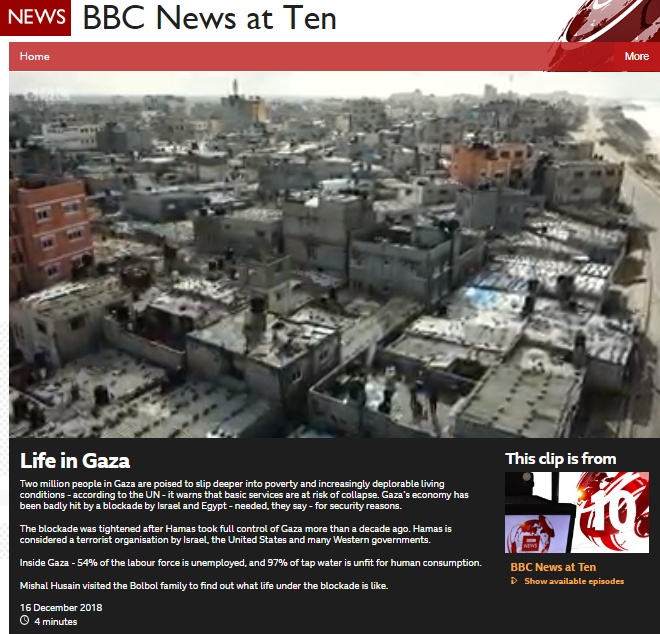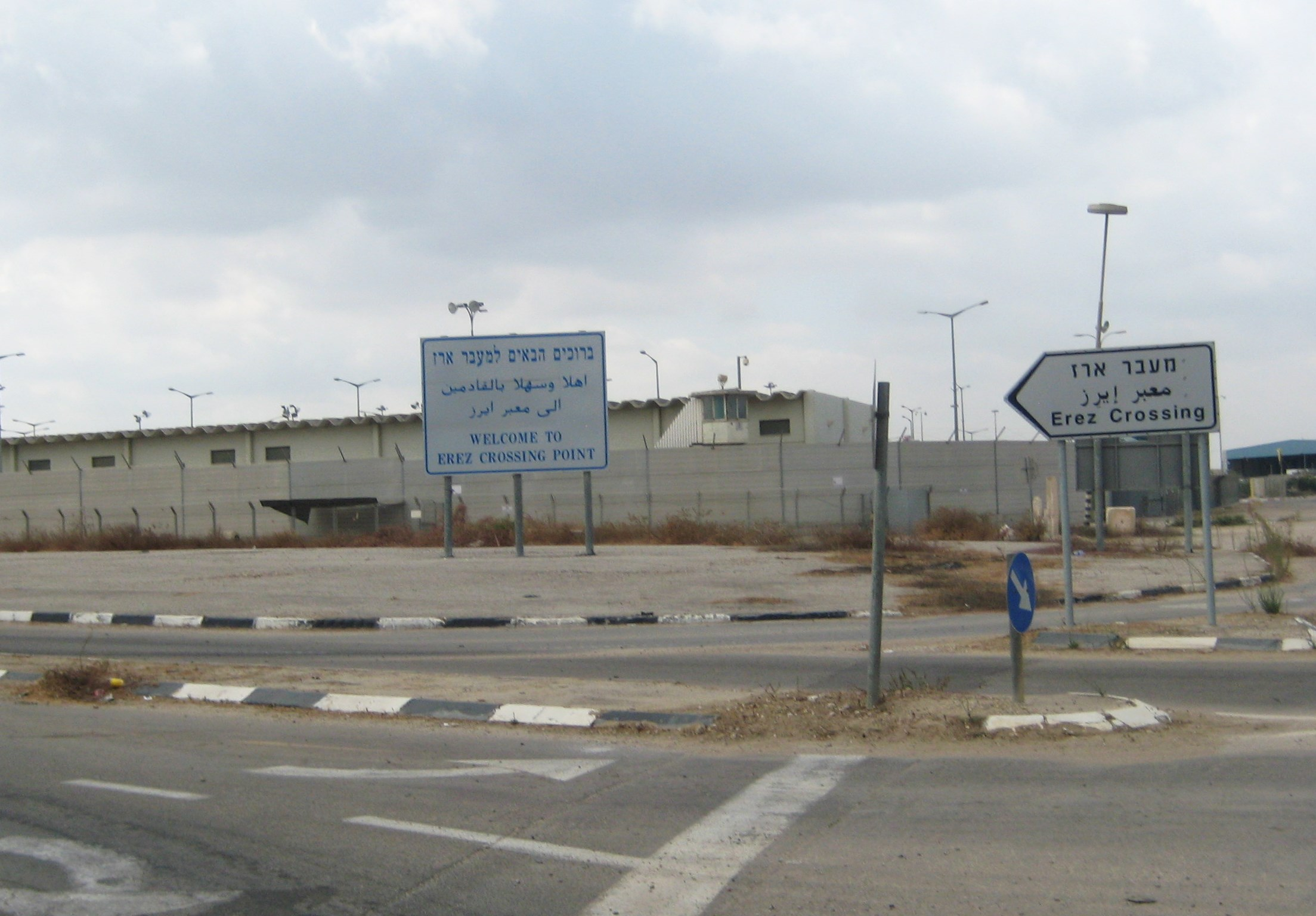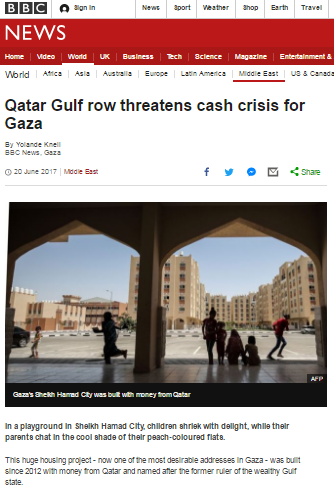Last month the BBC aired reports from the Gaza Strip presented by Radio 4’s Mishal Husain which included multiple references to issues concerning water, electricity and sewage.
As was noted here at the time:
“…listeners heard that “more than 90% of the population don’t have access to safe drinking water” and that “the desalination system in Gaza has broken down” because of “electricity”. No effort was made to clarify the full background to those statements or to explain that – as the BBC knows – the electricity crisis in the Gaza Strip (and resulting problems with water and sewage) has nothing to do with “the blockade”.”
The portrayal of those issues focused mainly on framing them as being primarily attributable to Israel’s counter-terrorism measures while no effort was made to explain the role of Hamas terrorism in bringing about those measures. The effects of Hamas’ financial prioritisation of terrorism over civilian welfare, its chronic mismanagement of services and utilities and infrastructure and the influence of the Hamas-Fatah split on the situation in the Gaza Strip were not adequately explained in the BBC’s reporting.
Like other BBC reporters before her, Mishal Husain did not bother to clarify that the “shortage of clean water” in the Gaza Strip is the result of years of over-pumping.
“The coastal aquifer, which is located under the coastal plain of Israel and the Gaza Strip, is the only source of natural water in Gaza. Due to rapid population growth, which in the last decade increased from nearly 1.5 million in 2007 to more than 2 million today, the demand for water in the Gaza Strip has surged. The increased water needs alongside the scarcity of alternative sources of water have led to the extreme over use of the aquifer. While the renewable extraction rate for Gaza’s underground aquifer is about 60 million cubic meters of rain water annually, Palestinians in Gaza have been drawing an estimated 200 million cubic meters a year for over a decade, leading to the infiltration of sea-water into the aquifer, and therefore raising the levels of salinity far beyond WHO health regulations.”
Neither were BBC audiences informed of the effects of Hamas’ failure to address the issue of sewage treatment.
“Gaza’s groundwater has also been extensively contaminated by sewage. The discharge of untreated sewage generated by the two million inhabitants into shallow ponds – which eventually percolates into the aquifer – has caused alarming levels of Nitrate (NO3).”
The chronic electricity shortage in the Gaza Strip, which was exacerbated in 2017 by the Palestinian Authority’s dispute with Hamas, also contributed to the problem.
“Wastewater plants are not fully operating, resulting in more than 100,000 cubic meters of raw or poorly treated sewage being discharged into the sea on a daily basis.”
Notably BBC audiences have heard nothing whatsoever about the health and environmental hazards created by the increased draining of sewage from neighbourhoods in the northern Gaza Strip since summer 2017 into a stream which crosses into Israeli territory. That practice continues and an additional hazard has emerged.
“Due to the dire economic situation in Gaza, the wastewater plant cannot undergo the needed treatments, prompting Palestinians living in the northern neighborhoods of the Strip—Beit Hanoun and Beit Lahia—to drain sewage into Nahal Hanun, which crosses Israel and empties into the sea, polluting the groundwater in the process.
In order to stop wastewater flow and reduce the environmental damage, the [Israeli] Water Authority has recently set up a pumping station near the Erez border crossing, which effectively made Israel responsible for water purification of the northern Gaza Strip. Before the Israeli intervention, the moshavim and kibbutzim near the border—Netiv HaAsara, Erez, Yad Mordechai, and Zikim—suffered from a continuous onslaught of mosquitoes and flies. […]
As well as that, massive piles of trash have accumulated in the area bordering the Eshkol Regional Council after three giant landfills were set up along the border fence, leaving the locals to cope with a putrid and toxic smell being carried by the wind across the border.
The landfills are derelict as dry and wet waste gets mixed up and subsequently burned, increasing the environmental impact.”
BBC reporting on the subject of shortages of water and electricity in the Gaza Strip and the related issue of inadequate sewage treatment nevertheless continues to adhere to the type of framing seen in an edition of ‘Hardtalk’ aired on multiple BBC platforms in November 2018 in which presenter Stephen Sackur told the Israeli minister being interviewed: [emphasis added]
“…you’re saying that Israel’s besieging tactics in Gaza – the fact that Gaza doesn’t really have power supplies that work, it doesn’t have clean water, it has a jobless rate of 60% or more – you’re saying all of this isn’t tough enough; that Israel should be hammering Gaza harder. Is that it?”
Although BBC audiences have long been steered towards the inaccurate view that (as also claimed by Hamas) all the economic and humanitarian problems in the Gaza Strip are attributable to Israeli counter-terrorism measures, while the roles of Hamas and the Palestinian Authority in creating and exacerbating the crisis are downplayed or airbrushed from the story, that framing clearly does not meet the BBC’s obligation to provide its funding public with “accurate and impartial news, current affairs and factual programming of the highest editorial standards”.
Related Articles:
BBC Radio 4 ‘Today’ Gaza Strip special – part one
BBC Radio 4 ‘Today’ Gaza Strip special – part two
BBC Radio 4 ‘Today’ Gaza Strip special – part three
BBC Radio 4 ‘Today’ Gaza Strip special – part four
BBC Radio 4 ‘Today’ Gaza Strip special – part five
Mishal Husain does ‘life in Gaza’ for BBC One TV




